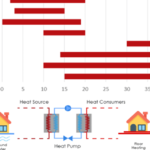Alternatives to Oil Heat in Northeast: Top Efficient Options
- Introduction to Heating Alternatives
- Electric Air-Source Heat Pumps (ASHPs)
- Geothermal Heat Pumps (GHPs)
- Electric Central Heating Systems Overview
- Infrared Heating Panels
- Storage Heaters
- Electric Radiators
- Electric Boilers
- Solar Heating Systems Explained
- Active Solar Heating
- Ductless Mini-Splits
- Hybrid Heating Systems
- Conclusion: Choosing the Right Alternative
Introduction to Heating Alternatives
As the cold season approaches in the Northeast, homeowners begin to consider the efficiency and cost of their heating systems. Traditionally, oil heat has been a popular choice due to its availability and the robustness of oil heating systems. However, with rising oil prices, environmental concerns, and advancements in heating technology, many are looking for alternatives to oil heat in northeast. This article explores the top efficient options available, aiming to provide comprehensive insights into each alternative, helping homeowners make informed decisions for a warmer, more sustainable home.
Electric Air-Source Heat Pumps (ASHPs)
Electric Air-Source Heat Pumps (ASHPs) have emerged as a leading alternative to oil heat in northeast due to their efficiency and environmental benefits. ASHPs extract heat from the outdoor air, even in cold temperatures, and transfer it inside to heat your home. They can reverse the process in the summer, acting as air conditioners. The efficiency of ASHPs has significantly improved, making them suitable for the colder climates of the Northeast. They are known for reducing energy consumption by approximately 50% compared to oil heating systems, translating into substantial savings on utility bills.
Geothermal Heat Pumps (GHPs)
Geothermal Heat Pumps (GHPs) represent another efficient and environmentally friendly alternative to oil heat in northeast. GHPs utilize the stable temperature of the earth a few feet below the surface to heat and cool your home. In the winter, the system extracts heat from the ground and transfers it indoors; in the summer, the process is reversed. The installation of GHPs involves a higher upfront cost, but the long-term savings and low maintenance costs can offset this. Additionally, GHPs can reduce energy consumption by up to 60% compared to traditional heating systems.
Electric Central Heating Systems Overview
Electric central heating systems offer a range of options for those seeking alternatives to oil heat in northeast. These systems are known for their ease of installation, low maintenance, and clean operation. Unlike oil heating, electric heating does not produce carbon emissions on-site, making it a more environmentally friendly choice. The following sections delve into specific types of electric heating systems.
Infrared Heating Panels
Infrared heating panels are a modern and efficient form of electric heating. They work by radiating infrared heat directly to objects and people in the room, rather than heating the air. This direct transfer of heat makes them incredibly efficient and can result in energy savings. Infrared panels are sleek, can be wall-mounted, and are virtually maintenance-free, making them an attractive alternative to oil heat in northeast.
Storage Heaters
Storage heaters are a type of electric heater designed to take advantage of off-peak electricity rates by storing heat at night and releasing it during the day. This can be a cost-effective alternative to oil heat in northeast for those who have access to time-of-use electricity pricing. Modern storage heaters are much more efficient and controllable than older models, offering better insulation and programmable settings to optimize heat release.
Electric Radiators
Electric radiators provide instant heat and offer a level of control and flexibility unmatched by traditional oil heating systems. They are easy to install, require no pipework, and can be used to heat individual rooms or an entire house. With advancements in technology, electric radiators have become more energy-efficient, making them a viable alternative to oil heat in northeast.
Electric Boilers
Electric boilers are another alternative to oil heat in northeast, especially for homes that already have a water-based central heating system. They are clean, quiet, and efficient, converting almost all the electricity they use into heat. While the cost of electricity is higher than oil, electric boilers can be a good option for homes that are well-insulated and have modern heating controls.
Solar Heating Systems Explained
Solar heating systems harness the power of the sun to provide heat for your home, offering a sustainable and renewable alternative to oil heat in northeast. There are several types of solar heating systems, but active solar heating is among the most effective for residential use.
Active Solar Heating
Active solar heating systems use solar collectors, usually mounted on the roof, to absorb solar energy. This energy is then used to heat water or air, which is distributed throughout the home. While the initial installation cost can be high, the reduction in energy bills and the environmental benefits make active solar heating a compelling alternative to oil heat in northeast.
Ductless Mini-Splits
Ductless mini-splits are a versatile and efficient heating and cooling solution. They consist of an outdoor compressor unit and one or more indoor air-handling units, connected by a small conduit. Mini-splits are highly efficient, offer individual room control, and do not require ductwork, making them an excellent alternative to oil heat in northeast for homes without existing ducts or for new additions.
Hybrid Heating Systems
Hybrid heating systems combine the efficiency of a heat pump with the power of a traditional furnace, providing a flexible and efficient alternative to oil heat in northeast. These systems automatically switch between the heat pump and furnace, depending on which is most efficient at any given time. This can result in significant energy savings and reduced carbon emissions, making hybrid systems an attractive option for those looking to move away from oil heating.
Conclusion: Choosing the Right Alternative
Exploring alternatives to oil heat in northeast reveals a range of options, each with its own benefits and considerations. Whether you prioritize environmental sustainability, cost savings, or system efficiency, there is an alternative heating solution that can meet your needs. By carefully evaluating your home's specific requirements and consulting with heating professionals, you can select the right alternative to oil heat, ensuring a warm, comfortable, and sustainable home for years to come.





Leave a Reply